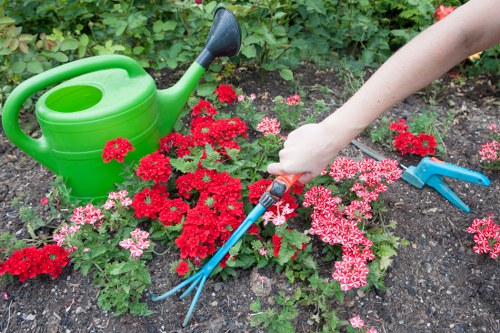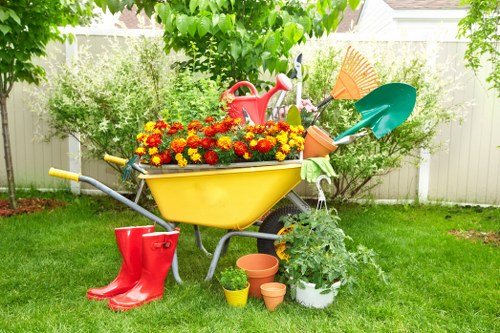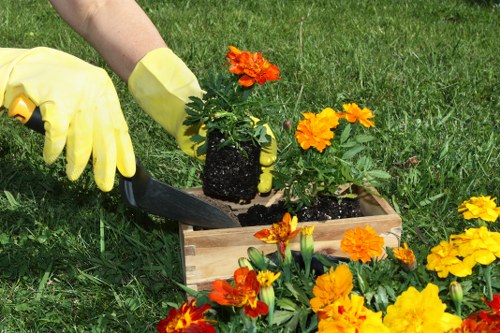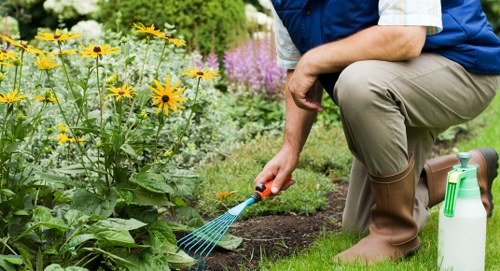Effective Driveway Algae Removal in Hendon: A Comprehensive Guide

Algae growth on driveways is a common issue faced by homeowners in Hendon. Not only does it detract from the aesthetic appeal of your property, but it can also make your driveway slippery and unsafe. Understanding how to effectively remove algae and prevent its recurrence is essential for maintaining a clean and safe driveway.
Algae thrive in damp and shaded environments, making driveways with limited sunlight particularly susceptible. The accumulation of algae can lead to surface degradation over time, increasing maintenance costs and potentially reducing the lifespan of your driveway.
Addressing algae growth promptly can save you time and money in the long run. This guide explores various methods and strategies for driveway algae removal in Hendon, ensuring your driveway remains spotless and safe throughout the year.
Understanding Algae Growth on Driveways

Algae are simple, plant-like organisms that require moisture, shade, and nutrients to thrive. On driveways, they typically grow in cracks and crevices where water can accumulate. The presence of organic debris, such as leaves and dirt, can provide additional nutrients, fostering a conducive environment for algae proliferation.
Hendon's climate, characterized by frequent rainfall and varying temperatures, creates ideal conditions for algae growth. These environmental factors, combined with the structural features of driveways, contribute to the persistent issue of algae formation.
Recognizing the factors that promote algae growth is the first step in effectively combating it. By addressing these conditions, homeowners can implement preventive measures to reduce the likelihood of algae returning after removal.
Methods for Driveway Algae Removal

Several methods can be employed to remove algae from driveways, each varying in effectiveness and cost. It's important to choose a method that aligns with your driveway's material and the extent of algae growth.
1. Mechanical Cleaning: This involves the physical removal of algae using tools like scrub brushes, pressure washers, or specialized cleaning equipment. Mechanical cleaning is effective for small to moderate algae infestations but may not suffice for extensive growth.
2. Chemical Treatments: Algaecides and other chemical solutions can be applied to kill algae on contact. While effective, it's crucial to select environmentally friendly products to minimize potential harm to surrounding vegetation and wildlife.
Using Pressure Washers for Algae Removal

Pressure washing is a popular method for removing algae due to its efficiency and thoroughness. High-pressure water streams can effectively eliminate algae without the need for chemical treatments. However, care must be taken to avoid damaging the driveway surface, especially if it is made of porous materials like concrete or stone.
When using a pressure washer, it's advisable to start with a lower pressure setting and gradually increase it as needed. This approach helps prevent potential surface erosion while still achieving effective algae removal.
Regular maintenance pressure washing can also serve as a preventive measure, deterring future algae growth by keeping the driveway clean and free from organic debris.
Eco-Friendly Solutions for Algae Control

For environmentally conscious homeowners, eco-friendly solutions offer an effective alternative to chemical treatments. Common natural remedies include a mixture of vinegar and water, which can kill algae without leaving harmful residues.
Another sustainable option is using baking soda and water, which not only removes algae but also neutralizes odors. These solutions are safe for both your driveway and the surrounding environment, making them ideal for those seeking green cleaning methods.
Implementing these eco-friendly strategies can contribute to long-term algae control while minimizing your ecological footprint.
Preventing Future Algae Growth

Prevention is key to maintaining a clean driveway. Implementing measures to reduce moisture and improve sunlight exposure can significantly decrease the likelihood of algae returning.
Ensure proper drainage around your driveway to prevent water accumulation. Addressing any leaks or pooling areas can eliminate the damp conditions that foster algae growth.
Additionally, trimming overhanging branches and ensuring adequate sunlight exposure can help keep your driveway dry and inhospitable to algae.
Regular Maintenance Practices

Incorporating regular maintenance into your routine can effectively prevent algae from taking hold. This includes sweeping away debris, promptly addressing spills, and resealing driveway surfaces to make them less porous and less likely to retain moisture.
Routine inspections can help identify early signs of algae growth, allowing for swift action before the problem escalates.
Maintaining a consistent cleaning schedule ensures that your driveway remains free from algae and other unwanted substances.
Choosing Professional Driveway Algae Removal Services in Hendon

While DIY methods can be effective, enlisting professional services offers several advantages. Professional driveway algae removal services in Hendon possess the expertise and equipment necessary to tackle severe algae infestations efficiently.
Professionals can assess the extent of algae growth and recommend the most effective removal and prevention strategies tailored to your driveway's specific needs.
Additionally, hiring experts ensures that the cleaning process is carried out safely, preventing potential damage to your driveway or surrounding areas.
Benefits of Hiring Local Experts

Local experts in Hendon understand the unique environmental factors that influence algae growth in the area. Their familiarity with the local climate and typical driveway materials allows them to provide customized solutions that are both effective and sustainable.
Moreover, choosing a local service supports the community and often results in quicker response times and more personalized customer service.
Engaging local professionals ensures that your driveway receives the best possible care tailored to Hendon's specific conditions.
Local Areas Near Hendon for Driveway Algae Removal

Hendon is surrounded by several areas that may also require driveway algae removal services. Understanding the proximity and unique characteristics of these areas can help homeowners seek the right assistance.
Below are some of the closest areas to Hendon that benefit from expert algae removal services:
- Golders Green: Just northwest of Hendon, Golders Green experiences similar weather patterns, making algae removal a common necessity.
- Brent Cross: Located nearby, Brent Cross not only has busy commercial zones but also residential areas prone to algae growth.
- Colindale: To the northeast, Colindale's extensive residential spaces require regular driveway maintenance.
- Queen's Park: East of Hendon, Queen's Park benefits from lush greenery that can contribute to algae proliferation on driveways.
- Whetstone: Southeast of Hendon, Whetstone homeowners often seek professional algae removal to maintain their driveways' appearance.
- Mill Hill: North of Hendon, Mill Hill's rural influences mean that driveways can be susceptible to moss and algae growth.
- Burnt Oak: Adjacent to Hendon, Burnt Oak's varying driveway materials respond differently to algae challenges.
- West Hendon: Directly west, West Hendon shares many of the same algae removal needs as central Hendon.
- Temple Fortune: Southwest of Hendon, Temple Fortune's driveways often require eco-friendly algae control solutions.
- Neasden: Further west, Neasden's urban setting presents unique challenges for algae removal.
Each of these areas shares common environmental factors with Hendon, making comprehensive algae removal services essential for maintaining property aesthetics and safety.
Choosing the Right Algae Removal Product
Selecting the appropriate product for algae removal is crucial for effective treatment. It's important to consider the type of driveway surface, the severity of algae growth, and environmental impact when choosing a product.
For concrete driveways, acidic cleaners can be particularly effective. However, they must be used with caution to avoid damaging the surface or surrounding vegetation.
Alternatively, enzymatic cleaners offer a safer option that uses natural enzymes to break down algae without harsh chemicals.
Eco-Friendly Product Options
Eco-friendly products are increasingly popular among homeowners seeking sustainable cleaning solutions. These products minimize environmental impact while still providing effective algae removal.
Common eco-friendly options include vinegar-based solutions, hydrogen peroxide mixtures, and biodegradable algaecides. These alternatives ensure that your driveway is cleaned without contributing to pollution or harming local wildlife.
Choosing eco-friendly products aligns with broader environmental goals and supports the health of the local ecosystem in Hendon.
Cost Considerations for Algae Removal
The cost of algae removal can vary based on several factors, including the size of the driveway, the extent of algae growth, and the chosen removal method.
DIY methods tend to be more cost-effective, requiring only the purchase of cleaning supplies. However, professional services, while more expensive, offer expertise and comprehensive solutions that may be more efficient in the long run.
Understanding the potential costs involved can help homeowners budget accordingly and choose the most appropriate algae removal strategy for their needs.
Budget-Friendly Algae Removal Tips
For those looking to manage costs, several budget-friendly tips can enhance algae removal efforts. Utilizing household items like baking soda and vinegar can provide effective cleaning without breaking the bank.
Regular maintenance, such as sweeping and prompt cleaning of spills, can prevent extensive algae growth, reducing the need for expensive treatments.
Investing in durable driveway materials and proper sealing can also minimize future algae-related expenses by making driveways less susceptible to algae colonization.
Long-Term Maintenance for a Algae-Free Driveway
Achieving a long-term algae-free driveway requires a combination of effective removal methods and ongoing maintenance practices. Consistently applying preventive measures ensures that algae do not re-establish themselves.
Key maintenance practices include regular cleaning, ensuring proper drainage, and minimizing shade and moisture retention on driveway surfaces.
By adopting a proactive approach to driveway care, homeowners can enjoy a clean and safe driveway year-round.
The Role of Sealing Driveways
Sealing your driveway is a highly effective way to prevent algae growth. Sealants create a protective barrier that reduces porosity, making it harder for moisture and organic matter to penetrate the surface.
Regular sealing, ideally once every few years, can significantly extend the lifespan of your driveway and keep it looking pristine.
When selecting a sealant, it's important to choose one that is compatible with your driveway material and offers protection against algae and other environmental factors.
Environmental Impact of Algae Removal
Considering the environmental impact of algae removal methods is essential for responsible driveway maintenance. Harsh chemical treatments can have adverse effects on local ecosystems, contaminating soil and water sources.
Opting for eco-friendly products and methods minimizes environmental harm while still providing effective algae control.
Additionally, proper disposal of cleaning residues ensures that harmful substances do not enter the environment, supporting sustainable driveway maintenance practices.
Minimizing Chemical Use
Reducing the reliance on chemical treatments is beneficial for both the environment and your health. Natural cleaning solutions, such as vinegar and baking soda, offer effective alternatives that are safe to use around pets and children.
Implementing preventive measures, like proper drainage and regular maintenance, can further decrease the need for chemical interventions.
By prioritizing environmentally friendly methods, homeowners contribute to the preservation of local ecosystems and promote a healthier living environment.
Conclusion
Driveway algae removal in Hendon is a manageable task with the right knowledge and strategies. By understanding the causes of algae growth and implementing effective removal and prevention methods, homeowners can maintain a clean and safe driveway.
Whether opting for DIY solutions or professional services, prioritizing eco-friendly practices ensures that your maintenance efforts are sustainable and environmentally responsible.
Regular upkeep and proactive measures are key to enjoying a pristine driveway year-round, enhancing both the appearance and functionality of your property.
Frequently Asked Questions
1. How often should I clean my driveway to prevent algae growth?
Regular cleaning, at least twice a year, can help prevent algae from establishing. Additionally, prompt removal of spills and debris can reduce the likelihood of algae proliferation.
2. Are there any eco-friendly products specifically recommended for algae removal?
Yes, solutions like vinegar and baking soda mixtures, hydrogen peroxide, and biodegradable algaecides are effective and environmentally friendly options for algae removal.
3. Can pressure washing damage my driveway?
When used correctly, pressure washing is safe. It's important to start with a lower pressure setting and gradually increase it to avoid damaging surface materials, especially if your driveway is made of porous materials.
4. How can I improve drainage to prevent algae growth?
Ensuring that water flows away from your driveway by addressing leaks, installing proper drainage systems, and grading the driveway to slope away can significantly reduce moisture accumulation and deter algae growth.
5. When should I consider hiring a professional for algae removal?
If algae growth is extensive or if DIY methods are ineffective, it's advisable to hire a professional driveway algae removal service. Professionals have the expertise and equipment to handle severe infestations efficiently.


